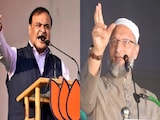US National Security Adviser Jake Sullivan making a quick trip before Prime Minister Narendra Modi's visit to Washington to tie up deliverables is unusual. Normally, Foreign Office diplomats are tasked with this. Evidently, the White House is driving this state visit and is taking direct ownership of it.
Unusually, Sullivan in a meeting with select journalists in New Delhi indicated some deliverables when our own side has not spoken about them yet. He seems to have preempted our government, catering to the public interest in potential outcomes from a visit that is drawing huge media attention. He talked of "substantial results" in collaboration in semi-conductor supply chains and a "host of substantial announcements in many areas". This would include some progress in areas such as the deployment of 5G, 6G and Open RAN, and aligning approaches in Artificial Intelligence, machine learning and advanced wireless. On the GE 414 engine, he talked of efforts to make progress but refused to say more about "exactly where it is". "Stay tuned and see where things are next week," he advised reporters. Since then more information about the project has come into the public domain.
Sullivan spoke of the "long-term vision of greater integration of our defence supply chain" and doing the "kind of technology transfer that is in India's interest". Towards this, he said, President Joe Biden has directed every element of the US government to "remove unnecessary and outmoded obstacles and barriers to deeper defence trade and technology cooperation" with India. What this really means is that the direction of ties in this broad domain is being charted but much work remains to actualise the agenda.
External Affairs Minister S Jaishankar, in his recent interview with The Economist, was more reticent about the outcome of the visit, saying that it is for the US to say what they are comfortable with, and that having been long in the game he wanted to be "cautious" and avoid predictions. "We will have to wait and see specifically what we are able to close out by the time the Prime Minister arrives," said the Foreign Minister.
Surprisingly, The Indian Express carried an article based on "sources", which gave extensive details of the jet engine project, the 11 key technologies to be transferred and the extent of Transfer of Technology (ToT) - around 80% of value and technology to be transferred to HAL in the next two to three years (the reference to "value" gives flexibility to actual transfer). This is generally confidential information. Other reports talk of 50% ToT, of the Administration advising the Congress of the project for approval, and that the contract may be signed during the visit between General Atomics and HAL. What is emerging is that there will not be 100% ToT.
Meanwhile, the endemic anti-India lobbies in the US have moved to cloud the atmosphere of the visit as much as they can. This may not have much impact, given the high profile that the Biden administration wants to give the visit, but it is a reminder of the difficulties in dealing with the US establishment.
The Congressional Research Service (CRS) has issued a lengthy report on June 15 titled "India: Human Rights Assessments". This highly negative report is a compendium of all that various Western democracy and human rights organisations have lately written against India. There is no attempt at balance and objectivity. The report says that India is "identified by US government agencies, the United Nations, and some non-governmental organisations as the site of numerous human rights abuses, many of them significant, some seen as perpetrated by agents of state and federal governments. The reported scope and scale of abuses has increased under the leadership of Prime Minister Narendra Modi and his Hindu nationalist Bharatiya Janta Party, particularly since their re-election in 2019." The slant of the report is clear.
The report goes on to cite the calumny of the Sweden-based Varieties of Democracies project that India is an "elected autocracy" and is "one of the worst autocratizers in the last 10 years". Freedom House is quoted as re-designating India as "Partly Free". The State Department's 2022 Report on International Religious Freedom is quoted on the subject of the persecution of minorities. The recommendation of the US Commission on International Religious Freedom to designate India as a Country of Particular Concern is mentioned, as are the strictures of the Paris-based Reporters Without Borders that "press freedom is in crisis" in India. Freedom House is quoted, as is the State Department's Human Rights Report 2022, as well as reports of other bodies on restrictions in India on NGOs under the FCRA (Foreign Contribution Regulation Act), serious government corruption, human trafficking and bonded labour, human rights in Kashmir, gender-based violence, extra-judicial killings etc. In other words, the effort is to make Congressmen aware of India's human rights record before PM Modi's address to the joint session of the Congress.
On June 16, the Congressional Research Service (CSR) issued another report on "India-US Relations: Issues for Congress" which, while dealing with various aspects of India-US ties by and large factually - again has a chapter on human rights, which cites Secretary of State Antony Blinken's public and "scripted" rebuke to India during the 2+2 dialogue. It calls for the Congress to consider how to "conduct oversight of the administration handling of democracy and human rights concerns with respect to India". The report also refers tendentiously to the BBC documentary on Modi and subsequent tax raids on BBC offices in India. Significantly, the CSR report alludes to frustration in the State Department with "the kid-glove treatment" India receives, even in internal US government documents on human rights issues. The political agenda of those who have drafted the report is obvious.
The chapter on "India-Russia Relations and the War in Ukraine" speaks of dismay among some members of Congress, as well as many Western analysts who expected a stronger Indian position as a democracy. It warns that India may squander a portion of the goodwill it has built in recent decades, "both globally and in Washington DC". On oil purchases from Russia, a former US official is quoted as saying that the administration has shown "tremendous forbearance towards India's very disappointing response" and that Washington's frustration may increase over time, potentially hampering relations". This, again, is intended to generate pressure on India through the Congress, given that the Administration has taken a more pragmatic view of India's position.
The map accompanying the report provocatively shows China's claim on Arunachal Pradesh, contrary to the US government's position recognising India's sovereignty over the state.
Many articles have appeared in the journal Foreign Affairs published by the Council of Foreign Relations in New York targeting India on human rights, persecution of minorities, democracy backsliding and our position on the Ukraine conflict. It is clearly a propaganda campaign that reflects a decline in the journal's political, scholarly and even ethical standards.
The most recent broadside, both arrogant and insulting, is by a scholar of "South Asia" who lashes out against Modi personally and targets his government's policies on human rights (some US opponents of the Modi government, he says, advocate material support to Indian rights groups), democracy, freedom, minority issues, Russia and Ukraine, concluding that India is not living up to US values and that shared interests, not shared values should be the basis of US policy towards India.
There is a clear divide between the more responsible, mature and forward-looking view of the US administration and the guerrilla warfare being conducted against India by the US media, think tanks and India experts. Minister Jaishankar alluded to this in his interview with The Economist when he said, "We are having this problem with a lot of media houses, with some think tanks, a lot of activist organisations, with a lot of political forces....as our elections come closer, they start doing these things."
(Kanwal Sibal was Foreign Secretary and Ambassador to Turkey, Egypt, France and Russia, and Deputy Chief Of Mission in Washington.)
Disclaimer: These are the personal opinions of the author.















